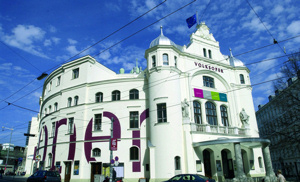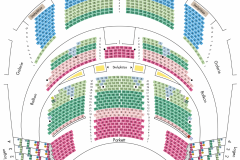Musical My fair Lady
Mo | Tu | We | Th | Fr | Sa | Su |
Musical by Frederick Loewe, Alan Jay Lerner
in German language
It’s a true cult performance: My Fair Lady explores the power of language, and the power struggle between men and women. Since 1979, the musical has been captivating audiences at the Volksoper. Phonetics professor Dr. Higgins transforms the flower girl Eliza Doolittle into a lady of high society through rigorous language training. However, does Higgins not only manipulate Eliza’s language, but her feelings as well?
Ruth Brauer-Kvam takes a new look at a beloved production with a fantastic ensemble, blowing away the dust that has accumulated over the years and allowing My Fair Lady to shine once again in its old-new brilliance!
Recommended from 9 years
Plot
Act I
In Edwardian London, Eliza Doolittle is a flower girl with a thick Cockney accent. The noted phonetician Professor Henry Higgins encounters Eliza at Covent Garden and laments the vulgarity of her dialect ("Why Can't the English?"). Higgins also meets Colonel Pickering, another linguist, and invites him to stay as his houseguest. Eliza and her friends wonder what it would be like to live a comfortable life ("Wouldn't It Be Loverly?").
Eliza's dustman father, Alfred P. Doolittle, stops by the next morning searching for money for a drink ("With a Little Bit of Luck"). Soon after, Eliza comes to Higgins's house, seeking elocution lessons so that she can get a job as an assistant in a florist's shop. Higgins wagers Pickering that, within six months, by teaching Eliza to speak properly, he will enable her to pass for a proper lady.
Eliza becomes part of Higgins's household. Though Higgins sees himself as a kindhearted man who merely cannot get along with women ("I'm an Ordinary Man"), to others he appears self-absorbed and misogynistic. Eliza endures Higgins's tyrannical speech tutoring. Frustrated, she dreams of different ways to kill him ("Just You Wait"). Higgins's servants lament the stressful atmosphere ("The Servants' Chorus").
Just as Higgins is about to give up on her, Eliza suddenly recites one of her diction exercises in perfect upper-class style ("The Rain in Spain"). Though Mrs Pearce, the housekeeper, insists that Eliza go to bed, she declares she is too excited to sleep ("I Could Have Danced All Night").
For her first public tryout, Higgins takes Eliza to his mother's box at Ascot Racecourse ("Ascot Gavotte"). Though Eliza shocks everyone when she forgets herself while watching a race and reverts to foul language, she does capture the heart of Freddy Eynsford-Hill. Freddy calls on Eliza that evening, and he declares that he will wait for her in the street outside Higgins' house ("On the Street Where You Live").
Eliza's final test requires her to pass as a lady at the Embassy Ball. After more weeks of preparation, she is ready. ("Eliza's Entrance"). All the ladies and gentlemen at the ball admire her, and the Queen of Transylvania invites her to dance with the prince ("Embassy Waltz"). A Hungarian phonetician, Zoltan Karpathy, attempts to discover Eliza's origins. Higgins allows Karpathy to dance with Eliza.
Act II
The ball is a success; Karpathy has declared Eliza to be a Hungarian princess. Pickering and Higgins revel in their triumph ("You Did It"), failing to pay attention to Eliza. Eliza is insulted at receiving no credit for her success, packing up and leaving the Higgins house. As she leaves she finds Freddy, who begins to tell her how much he loves her, but she tells him that she has heard enough words; if he really loves her, he should show it ("Show Me").
Eliza and Freddy return to Covent Garden but she finds she no longer feels at home there. Her father is there as well, and he tells her that he has received a surprise bequest from an American millionaire, which has raised him to middle-class respectability, and now must marry his lover. Doolittle and his friends have one last spree before the wedding ("Get Me to the Church on Time").
Higgins awakens the next morning. He finds himself out of sorts without Eliza. He wonders why she left after the triumph at the ball and concludes that men (especially himself) are far superior to women ("A Hymn to Him"). Col. Pickering is concerned about Eliza’s well-being, calling the police as well as contacting an old chum he believes will help them track her down.
Higgins despondently visits his mother's house, where he finds Eliza. Eliza declares she no longer needs Higgins ("Without You"). As Higgins walks home, he realizes he's grown attached to Eliza ("I've Grown Accustomed to Her Face"). At home, he sentimentally reviews the recording he made the day Eliza first came to him for lessons, hearing his own harsh words. Eliza suddenly appears in his home. In suppressed joy at their reunion, Professor Higgins scoffs and asks, "Eliza, where the devil are my slippers?"
Program and cast
Conductor: Charlotte Corderoy
Stage direction: Robert Herzl
Set design: Rolf Langenfass
Costume design: Rolf Langenfass
Based on a choreography by: Susanne Kirnbauer
Choreography by: Gerhard Senft
Choir director: Roger Díaz-Cajamarca
Eliza Doolittle: Paula Nocker
Henry Higgins: Markus Meyer
Oberst Pickering: Manuel Rubey
Alfred P. Doolittle: Karl Markovics
Mrs. Higgins: Marianne Nentwich
Mrs. Pearce: Martina Dorak
Freddy Eynsford-Hill: Lionel von Lawrence
Mrs. Eynsford-Hill: Ursula Pfitzner
Volksoper Vienna
Public transport:
Underground line U6
Trams 40, 41, 42
Bus 40A
Stop "Währinger Straße / Volksoper"
A taxi stand is located at Währinger Gürtel.
Parking garages in WIFI and AKH
The Volksoper is Vienna’s main stage for operetta, opera, musicals and ballet, offering sophisticated musical entertainment. Colourful, eclectic and full of vitality, it is the only theatre dedicated to the genre of operetta.
Operetta belongs to Vienna and Vienna installed it at the home of operetta, Volksopera Vienna, which thereupon became the leading operetta house in the world. First class singers, actors and dancers together with a versatile orchestra cunjure up a musical firework display every evening.
Johann Strauss, Franz Lehár, Emmerich Kálmán wrote their world famous beloved melodies for operettas such as “The Fledermaus”, “The Merry Widow” and “The Csárdás Princess”. A visit to at least one of these operettas at the Volksopera Vienna is a must for every visitor to Vienna!
Also performed are operas from the 18th, 19th and 20th centuries, as well as classic musicals and ballet. In addition, the Volksoper has a fifth longstanding and proven speciality: it stages soirées, cabaret and burlesque performances under the name of “Volksoper Spezial”.
In the repertory theatre, which seats 1,337 persons, some 300 performances of around 35 different productions are staged every year between September and June.

 EN
EN DE
DE IT
IT FR
FR ES
ES RU
RU JP
JP RO
RO
 Seating plan
Seating plan